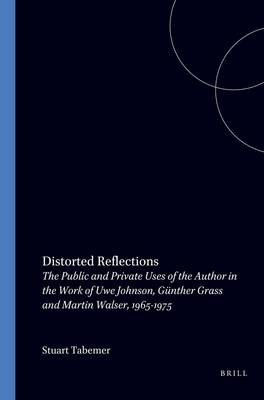
- Afhalen na 1 uur in een winkel met voorraad
- Gratis thuislevering in België vanaf € 30
- Ruim aanbod met 7 miljoen producten
- Afhalen na 1 uur in een winkel met voorraad
- Gratis thuislevering in België vanaf € 30
- Ruim aanbod met 7 miljoen producten
Zoeken
Distorted Reflections
The Public and Private Faces of the Author in the Work of Uwe Johnson, Günther Grass and Martin Walser, 1965-1975
Stuart Taberner
€ 77,95
+ 155 punten
Omschrijving
This volume presents a new approach to the political engagement of three major West German authors, Uwe Johnson, Günther Grass and Martin Walser. Whereas analysis of intellectuals' participation in the political upheaval of the late 1960s has tended to focus on speeches written in response to contemporary events, this book examines works of fiction for the way in which authors reflected upon their engagement in a more contemplative medium. Examination of these literary reflections reveals a mismatch between writers' confidence as public intellectuals and their private anxiety.
Beginning with a survey of intellectual engagement until the late 1960s, the present volume moves onto a theoretical discussion of the legitimacy of authors' public interventions. Three chapters are devoted to the fiction of Uwe Johnson, Günther Grass, and Martin Walser. Uwe Johnson's fiction embodies retreat, an acknowledgment of political impotence. Günther Grass's novels present the failings of the engaged intellectual as exemplary to an audience which is expected to learn from this inadequacy. Finally, Martin Walser's intellectual characters stylise private weakness to appeal to a middle-brow audience titillated by the public figure's confession of impotence. In Walser's work, political engagement degenerates into pure form, into a Camp gesture of authors' obsession with their private selves.
Beginning with a survey of intellectual engagement until the late 1960s, the present volume moves onto a theoretical discussion of the legitimacy of authors' public interventions. Three chapters are devoted to the fiction of Uwe Johnson, Günther Grass, and Martin Walser. Uwe Johnson's fiction embodies retreat, an acknowledgment of political impotence. Günther Grass's novels present the failings of the engaged intellectual as exemplary to an audience which is expected to learn from this inadequacy. Finally, Martin Walser's intellectual characters stylise private weakness to appeal to a middle-brow audience titillated by the public figure's confession of impotence. In Walser's work, political engagement degenerates into pure form, into a Camp gesture of authors' obsession with their private selves.
Specificaties
Betrokkenen
- Auteur(s):
- Uitgeverij:
Inhoud
- Aantal bladzijden:
- 144
- Taal:
- Engels
- Reeks:
- Reeksnummer:
- nr. 130
Eigenschappen
- Productcode (EAN):
- 9789042003538
- Verschijningsdatum:
- 1/01/1998
- Uitvoering:
- Paperback
- Formaat:
- Trade paperback (VS)
- Afmetingen:
- 150 mm x 220 mm
- Gewicht:
- 254 g

Alleen bij Standaard Boekhandel
+ 155 punten op je klantenkaart van Standaard Boekhandel
Beoordelingen
We publiceren alleen reviews die voldoen aan de voorwaarden voor reviews. Bekijk onze voorwaarden voor reviews.








